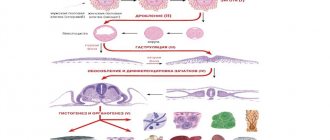If you feel nauseous to the point of vomiting, you feel sick from smells or the mere mention of certain foods, and the pregnancy test shows two lines, you have developed early toxicosis of pregnancy.
The main signs of toxicosis in pregnant women are as follows:
- nausea;
- vomit;
- salivation;
- depressed state;
- bad feeling;
- irritability;
- drowsiness;
- weight loss.
There are also rare forms of early toxicosis: dermatoses of pregnancy, tetany, osteomalacia, acute yellow liver atrophy, bronchial asthma of pregnant women.
At what stage of pregnancy does toxicosis begin?
Mostly, women suffer from toxicosis in the early stages of pregnancy. Most often, symptoms of early toxicosis appear at 5-6 weeks, sometimes already on the days of a missed period, and in some cases even earlier - starting from the first week of conception.
Some women claim that they feel nauseous and even vomit the very next day after unprotected intercourse. But experts view such claims with skepticism. “Toxicosis” in such cases most likely has other causes that are completely unrelated to pregnancy: for example, poisoning or malaise due to changes in blood pressure. A psychological factor cannot be ruled out: the girl begins to worry, worry, and emotionally experiences “signs” of pregnancy.
Toxicosis in the first trimester of pregnancy is most often observed. But much more dangerous late toxicoses also happen. Toxicosis is also called gestosis, but the term “gestosis of pregnant women” is more often used to refer to late toxicosis.
Toxicosis during pregnancy is a physiological phenomenon and does not require treatment (unlike gestosis). But if you feel very bad, vomiting is repeated frequently and weight loss is observed, then you need to seek help from a gynecologist.
The absolute norm is also the absence of any toxicosis and even the slightest hint of it. The idea that a pregnant woman must vomit is wrong.
Why is toxicosis dangerous?
A woman can feel the first signs and determine pregnancy much earlier than tests and ultrasound. When toxicosis begins, 2-3 weeks may pass from conception.
It is believed that early toxicosis is less dangerous than late toxicosis. Since toxicosis during pregnancy begins suddenly in the early stages, it also ends suddenly by the beginning or middle of the second trimester.
Preeclampsia (or toxicosis in later stages) manifests itself in a constant urge to vomit, the sense of smell is heightened, a woman’s irritation increases, and mood swings are a common occurrence with preeclampsia.
At the same time, swelling appears, protein in the urine increases, and blood pressure may “jump.” The brighter the symptoms, the more difficult the pregnancy is. This condition requires medical monitoring and elimination of the causes of gestosis. Treatment is selected individually and includes adjustments to the pregnant woman’s diet and lifestyle.
The complexity of treatment and the severity of gestosis depends on the level of intoxication. In any case, when toxicosis begins during late pregnancy, you must inform your gynecologist.
How long does toxicosis last during pregnancy?
Everything is very individual: from the manifestations of toxicosis to its duration. Some women feel only slight nausea, others are forced to go to the hospital for treatment. The same is true with duration: toxicosis during pregnancy is observed in different women for different periods, but most often gradually disappears by the beginning of the second trimester.
Toxicosis during pregnancy lasts until the period when the placenta is fully formed, that is, weeks up to the 12-14th. Then comes the calm second trimester in terms of well-being. By the third trimester of pregnancy, toxicosis may resume, and then it is already called gestosis. It also happens that toxicosis during pregnancy first appears at the end of the term. Preeclampsia is much more dangerous than early toxicosis, so you should definitely notify your doctor about its occurrence.
The signs of gestosis are also somewhat different. In particular, there is increased formation of edema and increased blood pressure.
Sometimes late toxicosis can begin in the second trimester, which is not safe for the fetus and the expectant mother. But, fortunately, everything will go away after childbirth - that’s for sure!
Causes of toxicosis during pregnancy
It is believed that toxicosis is a consequence of ongoing hormonal changes in the mother’s body, necessary for the normal development and bearing of the child. It is still not possible to answer exactly why toxicosis plagues pregnant women. But it has been established that pregnant women with diseases of the gastrointestinal tract, liver, thyroid gland, as well as women who smoke, work a lot and experience nervous overstrain are susceptible to toxicosis.
Among other probable causes of toxicosis during pregnancy, various researchers name the following:
- chronic diseases;
- pregnancy at a very young age;
- psychological unpreparedness for motherhood;
- hereditary predisposition.
Some scientists believe that toxicosis is a natural protection of the fetus from the possible effects of negative factors (for example, bad habits and unhealthy diet).
Many people believe that nausea and vomiting are completely normal for a pregnant woman. But in fact, this condition can be dangerous for both mother and fetus. It’s good if you just constantly want to sleep and you become extremely irritable for a minute. But debilitating vomiting, systematic fasting and rapid weight loss are not at all a condition that can be called normal. Even and especially for a pregnant woman.
In principle, it is considered normal if for some time a pregnant woman experiences attacks of nausea and vomiting no more than twice a day - in the morning, mostly on an empty stomach. But only on condition that the woman’s general condition does not worsen. If you are getting worse, you can't eat, you have frequent attacks, and you also experience weight loss - this is very dangerous. Therefore, it is better not to allow it to reach such a state, but to begin treating toxicosis on time.
Why does toxicosis develop?
Obstetricians and gynecologists explain this fact by the individuality of the body, the presence of chronic diseases, hormonal changes, stress and numerous external factors, but it has not yet been possible to identify a specific cause.
Doctors often explain the onset of toxicosis during pregnancy for two reasons:
Firstly, hormonal levels change. The fertilized egg enters the uterus, where implantation of the fertilized egg occurs. As a result of the vital activity of the embryo, human chorionic gonadotropin, a glycoprotein, is released into the woman’s blood. In addition, the level of the hormones progesterone and estrogen increases in the body of a pregnant woman. By week 10, the level of hCG in the blood reaches its maximum.
It is the presence of this hormone in a woman’s blood and urine that confirms the fact of pregnancy. Naturally, the body reacts to a sharp release of hormones. At the same time, even a specialist will not be able to name the exact date on which day toxicosis begins or how many weeks toxicosis begins, since the course of pregnancy in each case is a purely individual process.
Secondly, a common cause for toxicosis is the emotional state of a woman. Especially if the pregnancy is unplanned or the pregnant woman has fear for her future fate and health. In families where the pregnancy is long-awaited, the woman is often afraid for the further preservation of the fetus and pregnancy, and the experience of unsuccessful pregnancies increases the feeling of fear. It happens that a pregnant woman waits until after toxicosis begins in order to make sure of her pregnancy and its correct course, which causes even greater nervousness and uncertainty.
Increased excitability, stress, anxiety, and fear cause an increase in “stress hormones”, as a result of which the body again reacts to hormonal changes. Therefore, when toxicosis begins during pregnancy, you should calm down and mentally prepare yourself for a successful pregnancy and childbirth, your health will certainly improve.
Influence of hereditary factor
The hereditary factor largely determines at what week toxicosis begins, and whether it begins at all. If a mother carried her daughter to term and did not know what morning sickness was, then the likelihood that her daughter would also not feel signs of toxicosis is very high.
According to gynecologists, there is no clear answer to what month toxicosis begins. Just as there is no clear connection with a hereditary factor.
Much more often, doctors note the connection between toxicosis and problems of the gastrointestinal tract, the lifestyle and nutrition of the expectant mother.
Remedies for toxicosis during pregnancy
There are many different treatments for toxicosis. But not all of them are harmless, safe and effective. So, we repeat again: it is better not to start the disease.
Drug treatment. Among all the medications used to treat toxicosis (and there are about 20 of them), only no-spa, vitamins and microelements are to a certain extent harmless during pregnancy. The rest are very dangerous and toxic. But in certain conditions it is necessary to resort to their help - when the benefit of such treatment for the mother outweighs the potential risk to the fetus. Drug treatment of toxicosis must be comprehensive and include a number of different drugs. Such treatment is always carried out in a hospital setting, but, unfortunately, is not always successful.
More on the topic
Treatment of toxicosis in early pregnancy
When does toxicosis begin during pregnancy?
Absence of toxicosis during pregnancy: good or bad
Early toxicosis during pregnancy: when does it start and how to deal with it?
Toxicosis during pregnancy: what to do
Usually, if treatment was started on time, toxicosis passes successfully and the woman is discharged. But in rare cases there is no improvement:
- vomiting does not stop;
- dehydration of the body increases;
- body weight loss progresses;
- acetonuria progresses over 3-4 days;
- severe tachycardia is observed;
- the functions of the nervous system are impaired (adynamia, apathy, delirium, euphoria);
- characterized by icteric staining of the sclera and skin.
This condition of a pregnant woman is an indication for termination of pregnancy. But, fortunately, today this happens extremely rarely.
Immunocytotherapy is a modern invasive treatment method. It consists of injecting lymphocytes from her husband into the skin of her forearm. Improvement in the pregnant woman's well-being usually occurs within 24 hours. Immunocytotherapy also requires hospitalization and even a thorough examination of the child's father for infections (hepatitis B and C, HIV, Wasserman reaction). But this method is still dangerous: there is a risk of contracting hepatitis, for example.
Homeopathy is absolutely safe for the pregnant woman and the fetus and very effective, and therefore the preferred method of treating toxicosis. It allows you to select drugs individually and at the same time treats the entire body as a whole, not only women, but, if necessary, children. The likelihood of side effects and toxic overdose is excluded, and homeopathic medicines themselves are not addictive.
Aromatherapy. Peppermint will help prevent attacks of morning sickness: place one drop of this essential oil on your pillow or on a handkerchief that you place near the head of your bed. This extract has a beneficial calming effect not only on the entire body as a whole, but also specifically on your stomach, preventing its morning “rebellions.” Do this procedure several nights in a row and you will notice a clear improvement.
Carry ginger essential oil with you: when you suddenly feel sick and start to feel nauseous, drop a drop of ginger oil on your palm, rub it, bring it to your nose and calmly take deep breaths several times. This oil also helps with vomiting: add a drop to 0.5 liters of boiled water and perform steam inhalation.
To prevent nausea and vomiting during the day, it is recommended to rub the oil mixture into the supra-umbilical area in the morning: add one drop of ginger oil to a dessert spoon (10 ml) of any vegetable oil.
When using aromatic oils, pay attention to their quality: you can only buy essential oils that have a hygienic certificate and a certificate of conformity. It is better to do this at the pharmacy.
In addition to the types of treatment described, physiotherapy and herbal medicine are used during toxicosis. They also often resort to more exotic methods of treatment: hypnosis, electrosleep, acupuncture.
However, with mild manifestations of toxicosis, pregnant women can successfully curb it at home.
How to deal with toxicosis during pregnancy at home?
- Don't get out of bed abruptly in the morning. First, eat a handful of nuts or cookies prepared next to your bed in the evening.
- Eat small meals throughout the day, preferably every 2-3 hours.
- Frequent chewing helps a lot with nausea. Snack on lemon, nuts, dried fruits, mints, and tangerines. It is useful to chew cumin seeds or regular chewing gum for nausea.
- Try to exclude fried foods, pickles, chocolate and hard-to-digest foods from your diet.
- It has been proven that vitamin B6 reduces the manifestations of toxicosis, so your diet should include foods rich in it: fish, eggs, skinless chicken, nuts and legumes (beans, peas, lentils). Avocados contain large amounts of vitamin B6.
- Ginger has an antiemetic effect: it can be added to tea or simply chewed. Any products with added ginger (for example, ginger cookies) will help overcome the urge to vomit.
- Food should be light, but nutritious and contain all useful substances: fruits, unleavened cereals with water, bread.
- But if you really want it, eat what you want.
- You need to eat while lying down slightly. Or immediately after a meal, lie down for a while to rest.
- In case of toxicosis, it is necessary to eat warm or chilled food.
- Get into the habit of drinking a glass of water every morning on an empty stomach - this will reduce the feeling of nausea and help cope with illness.
- Drink alkaline mineral water without gas, after heating it.
- In general, drink plenty of fluids, but in small portions. Chamomile tea, cranberry juice, freshly squeezed apple juice, green tea with lemon, rosehip infusion, water with lemon juice and honey are especially useful.
- If you are drooling, it is good to rinse your mouth with infusions of chamomile, sage, and mint.
- Also take infusions of calendula, valerian, yarrow and mint: these plants stop spasms, have a beneficial effect on the gastrointestinal tract and perfectly calm the nerves.
- A proven remedy for combating toxicosis is mint. Based on it, you can prepare a tincture for toxicosis. Take two teaspoons of dry mint, a teaspoon of valerian root, two teaspoons of calendula flowers and the same amount of yarrow herb. The mixture needs to be poured with 400 ml of boiling water, left for 30 minutes and strained. Take two to three tablespoons six times a day in three courses of 25 days with 15-day breaks.
- Spend more time outdoors.
- Constantly ventilate the kitchen and use a hood to prevent odors from irritating you.
Don’t despair and believe in the best: it will end very soon. Early toxicosis, as a rule, stops by the beginning of the second trimester of pregnancy. However, late toxicosis also occurs - gestosis (in the second and third trimesters of pregnancy). Therefore, all our advice may still be very useful to you. And after giving birth, everything will definitely pass!
Especially for beremennost.net – Elena Kichak
Prevention of toxicosis
The best prevention of toxicosis will be the following actions:
- Refusal of bad habits and balanced nutrition. Avoid alcohol, cigarettes, spicy and fatty foods.
- If strong odors irritate you, eliminate the cause. When toxicosis begins in pregnant women, the previously pleasant aroma of perfumes, cosmetics, air fresheners, coffee and some food products can cause disgust. All this needs to be excluded.
- Avoid overtiring. Healthy sleep and a walk in the fresh air strengthen physical and moral balance during pregnancy. Nausea and motion sickness in public transport are also one of the signs of toxicosis, which can be eliminated if you use public transport less often.
- When toxicosis begins, it is often recommended to eat small meals. Frequent meals can reduce nausea, and small portions are easier to digest without causing heartburn. In addition, with this diet you can avoid problems with gaining excess weight.
- One of the most accessible and proven remedies for nausea is mint leaves. They can be brewed into tea. Have mint candies with you, but mint chewing gum, on the contrary, will make you feel worse.
- Don't forget to take a multivitamin with high selenium content. They contain the necessary complex of minerals, vitamins and microelements. If vitamins do not relieve nausea and vomiting, they will help restore your strength and replenish lost substances.
Author: editors of the Mama66 portal, Lada Sergeeva, practicing gynecologist
A woman in good health should have no problems during pregnancy. But according to statistics, more than half of pregnant women are susceptible to attacks of nausea and vomiting, and in 10-12% of them, toxicosis is diagnosed in severe forms and lasts a long time. Toxicosis usually begins at 4-5 weeks, and in rare cases, from the moment of conception (usually not associated with pregnancy). To prevent toxicosis from becoming an unpleasant surprise, a woman should know when it begins, the approximate end time, as well as the main symptoms and methods of getting rid of nausea and vomiting.









